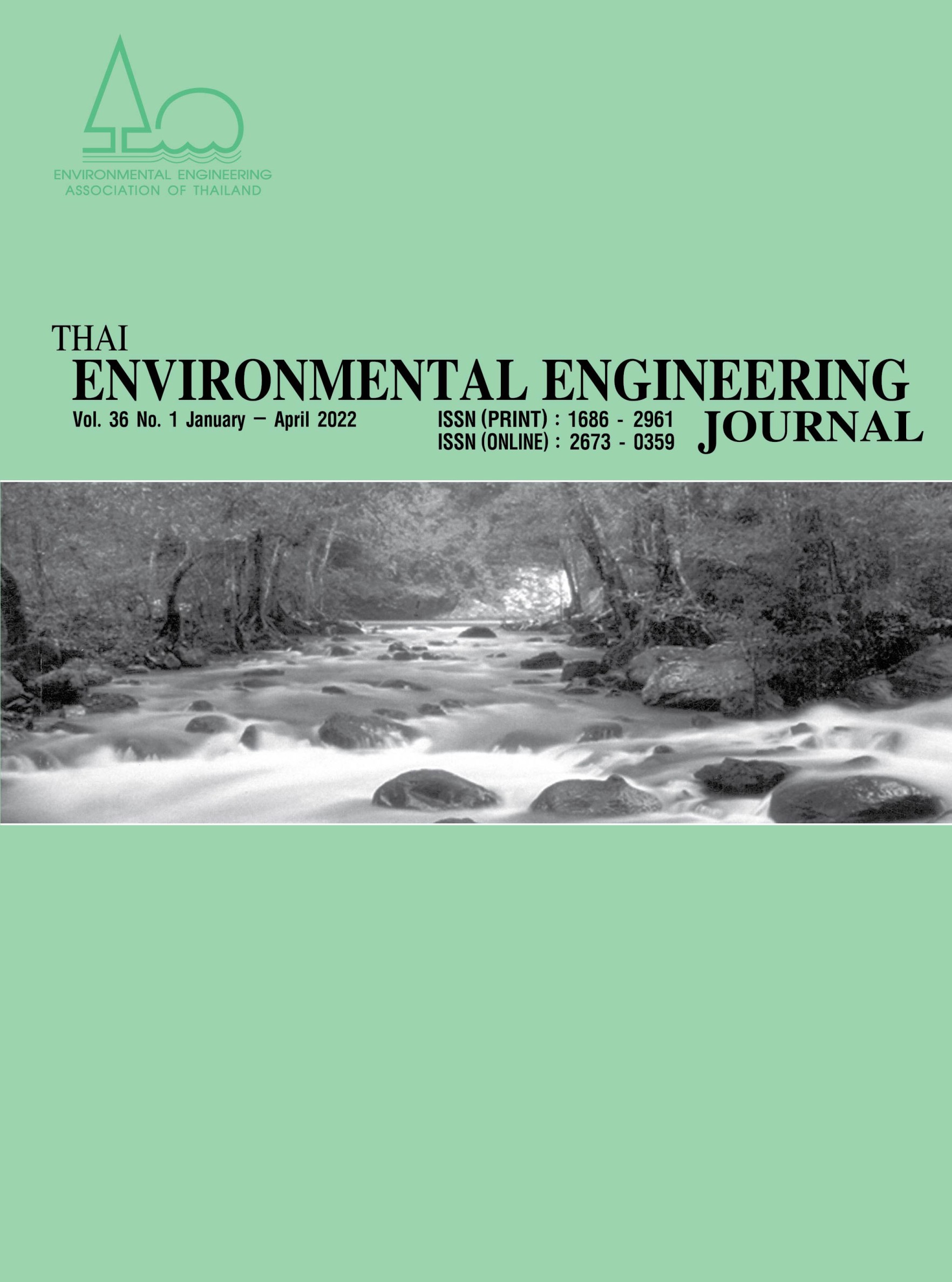Mask and ATK Wastes Management in Urban Community By People Participatory Process under COVID-19 Pandemic Crisis of Bangkok, Thailand
Main Article Content
Abstract
Under the situation of Coronavirus 2019 (COVID-19) pandemic for the past 2 years, people had used the facial masks (masks) for protection of COVID 19 and antigen test kit (ATK) waste and left its mixing with the general wastes without segregation at source. Rationally, It should conduct the study on such masks waste collection management as qualitative research, of which the objectives were 1) to develop the collection system of the used masks and ATK in the community by people participatory process, 2) to raise awareness for the importance of the hygienic collection of the used masks and ATK management and get familiarize with participatory process, 3) to survey the management of used masks and ATK management at the communities, construction worker camp sites, and industrial dormitories in Bangkok Metropolitan Administration (BMA) area. The study area covered 11 communities in Dusit District (Inner Bangkok), 5 construction worker camp sites in Laksi District, and 5 industrial plants in Bangkhen District. The study of 11 communities resulted that the used masks and ATK waste were averagely collected as for 19.25 kg/week or 2.75 kg/day with the trend of weekly increasing. The appropriate model for the communities on used masks and ATK management was the means of participation process. People participatory process was performed through the community leaders and committee for the provision of collection containers, location and number of containers, appointing date/time and frequency. The effective mean of participation process was not only public relation together with requesting for people participation but also monitoring the hygienic segregation and collection of the used masks and ATK wastes. The appropriate model for the construction worker camp sites was creating awareness for an importance on hygienic segregation and collection of the used masks and ATK wastes together with issuing the regulations for safe living in the camp for such hygienic segregation and collection of wastes. The communication to the workers should use simple and understandable language for hygienic mitigation measures. The appropriate model for industrial dormitories was creating the awareness on an importance of the hygienic collection management of the used masks and ATK wastes. The strong protection measures were issuing the regulation with strict enforcement on segregation and collection management of the used masks and ATK wastes under the intensive monitoring by the workers’ chief. The hygienic equipment and accessories had to be provided adequately for both number and locations of wastes drop-off point. Communication to the Thai and foreign workers by simple and understandable language.
Article Details
References
Department of Health. Meeting and Discussion on Infectious Wastes under the COVID-19 Pandemic. Accessed to https://www.kkpho.go.th/i2021/index.php/component/attachments/download/10115. (in Thai version)
Environmental Office, Bangkok Metropolitan Authority. 2564. Environmental Quality of Bangkok Metropolitan, BE 2562-2563. Accessed to. https://webportal.bangkok.go.th/public/user_files_editor/231/Doc_We/BSOE%202019-2020%20e-Book.pdf. (in Thai version)
Environmental Office, Bangkok Metropolitan Authority. 2564. Annual Action Plan. 2564. (Environmental Office). Accessed to http://www.oic.go.th/FILEWEB/CABINFO CENTER9/AWER/021GENERAL/DATA0001/00001646.PDF. (in Thai version)
Department of Health. 2563. Handbook of Measures and Guideline for Environmental Health Surveillance under the COVID-19 pandemic. Accessed to https://covid19.anamai.moph.go.th/web-upload/2xdccaaf3d7f6ae30ba6ae1459eaf3dd66/m_document/6730/34033/file_download/ecb4a988cd5b3244c0a1a20cfbb667cf.pdf. (in Thai version)
United Nations Environment Programme–UNEP. 2020. Waste Management during the COVID-19 Pandemic From Response to Recovery. ISBN No: 978-92-807-3794-3. Job No: DTI/2292/PA.
United Nations Human Settlements Programme: UN-HABITAT. Strategy Guidance: Solid Waste Management Response to COVID-19. https://unhabitat. org/sites/default/files/2020/05/un-habitat_strategy_guidance_swm_reponse_to_covid19.pdf.
Asian Development Bank (ADB). 2020. Managing Infectious Medical Waste during the COVID-19 Pandemic, https://www.adb.org/publications/managing-medical-waste-covid19, 2020.
European Union (EU.). 2020. Waste management in the context of the coronavirus crisis. https://ec.europa.eu/info/sites/default/files/waste_management_ guidance_dg-env.pdf.
Narendra Singh, Yuanyuan Tang, Zuotai Zhang, and Chunmiao Zheng. 2020. COVID-19 waste management: Effective and successful measures in Wuhan, China. Resour Conserv Recycl. 2020 Dec; 163: 105071. Published online 2020 Jul 27. doi: 10.1016/j.resconrec.2020.105071.
United Nations Environment Programme–UNEP. 2020. Waste Management during the COVID-19 Pandemic From Response to Recovery. ISBN No: 978-92-807-3794-3. Job No: DTI/2292/PA.
Rhee, S.-W. (2020). Management of used personal protective equipment and wastes related to COVID-19 in South Korea. Waste Manag. Res., 38(8) (2020), 820-824.
Department of Public Relations, Thailand, online, https://thainews.prd.go.th/th /news/detail/ TCATG210428145313712. (in Thai version)
Sangkham, S. 2020. Face mask and medical waste disposal during the novel COVID-19 pandemic in Asia. J. Case Studies in Chemical and Environmental Engineering. 2020; 10052.
International Association for Public Participation. Stakeholder participation: IAP2 public participation spectrum. IAP2 International Federation, https://i2s.anu.edu.au/resources/stakeholder-participation-iap2-public-participation-spectrum/, 2014.
Lubna Salsabila, Eko Priyo Purnomo and Hazel D. Jovita. 2021. The Importance of Public Participation in a Sustainable Solid Waste Management. Journal of Governance and Public Policy. ISSN: 2460-0164 (print), 2549-7669 (Online). Vol 8, No 2 (2021): Page no: 106-123.
O'Connell, Elizabeth J. Increasing Public Participation in Municipal Solid Waste Reduction. The Geographical Bulletin; Ypsilanti Vol. 52, Iss. 2, (Nov 2011): 105-118.
Mejjad, N.; Cherif, E.K.; Rodero, A.; Krawczyk, D.A.; El Kharraz, J.; Moumen, A.; Laqbaqbi, M. and Fekri, A. Disposal Behavior of Used Masks during the COVID-19 Pandemic in the Moroccan Community: Potential Environmental Impact. Int. J. Environ. Res. Public Health 2021, 18, 4382. https:// doi.org/10.3390/ ijerph18084382.
Yang, L., Yu, X., Wu, X., Wang, J., Yan, X., Jiang, S. and Chen, Z. 2021. Emergency response to the explosive growth of health care wastes during COVID-19 pandemic in Wuhan, China. Resour. Conserv. Recycl., 164 (2021), p. 105074.


